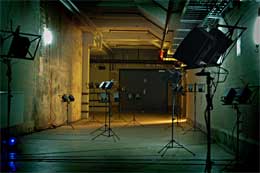 "Bacterial Orchestra is a self-organizing evolutionary musical organism made of audio cells. Every cell -consisting of microphone and a loudspeaker- listens to its surroundings and picks up sounds trying to play them back in sync with what it hears. It can be the background noise, people talking or sound played by other cells. Every cell is simple, but together they create a complex whole.
"Bacterial Orchestra is a self-organizing evolutionary musical organism made of audio cells. Every cell -consisting of microphone and a loudspeaker- listens to its surroundings and picks up sounds trying to play them back in sync with what it hears. It can be the background noise, people talking or sound played by other cells. Every cell is simple, but together they create a complex whole.
Every cell is born with a unique set of characteristics (its DNA) that control the way it will react to sound. If it’s not fit enough, the cell dies and is reborn with a new DNA (you can also adopt a cell, btw.)
The result is a musical organism adapting to its environment, evolving with neighbouring cells and spectators and becoming musically smarter and smarter." (link)

Interactive Architecture dot Org is a weblog about the emerging practice within architecture that aims to merge the digital virtual with tangible and physical spatial experience. Instead of defining a fixed architectural product it is an architecture in constant flux best suited to prototyping and semi-perminant installations. It is maintained by
Ruairi Glynn. Bartlett School of Architecture.HMC MediaLab: You have been writing regularly on the subject of interactive architecture for many months now, but how do you categorise it? How do you decide what is interactive architecture and what is not?
interactivearchitecture.org has a life of its own. Initially when I started it was very focused reporting on what could be easily identified as interactive architecture, i.e. interactive installations for large scale architectural projects such as BIX, at the Kunsthaus Graz in Austria, Toshio Iwai’s ICE (Interactive Communicative Experience) for the Bloomberg Headquarters in Tokyo, NOX’s Son-O-House or Jason Bruges’s Memory Wall at the Puerta America Hotel.
Since then I’ve begun to widen the focus to include interactive furniture, experimental projects at universities and research groups, and interesting new materials that I believe will transform how we apply technology into the built environment right down to nanotechnology such as the Buckymobile - Nano-Car. Scale is an enormously interesting facet of interactive architecture because increasingly this technology is becoming invisible to the naked eye. One guy at the moment whose work I really like is Usman Haque.

His project Haunt has no visible technology but using humidity, temperature, electromagnetic and sonic frequencies that parapsychologists have associated with haunted spaces, he’s attempting to make a very powerful experience within what seems an unexceptional space. As a whole I find projects that suggest a future where integration of digital systems into the fabric of the built environment, rather than having computers as distinct objects embody what interactive architecture is about. Hopefully this will enable people to move around and interact with computers more naturally than they currently do.









 His project Haunt has no visible technology but using humidity, temperature, electromagnetic and sonic frequencies that parapsychologists have associated with haunted spaces, he’s attempting to make a very powerful experience within what seems an unexceptional space. As a whole I find projects that suggest a future where integration of digital systems into the fabric of the built environment, rather than having computers as distinct objects embody what interactive architecture is about. Hopefully this will enable people to move around and interact with computers more naturally than they currently do.
His project Haunt has no visible technology but using humidity, temperature, electromagnetic and sonic frequencies that parapsychologists have associated with haunted spaces, he’s attempting to make a very powerful experience within what seems an unexceptional space. As a whole I find projects that suggest a future where integration of digital systems into the fabric of the built environment, rather than having computers as distinct objects embody what interactive architecture is about. Hopefully this will enable people to move around and interact with computers more naturally than they currently do.
